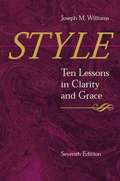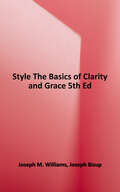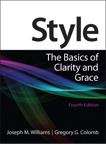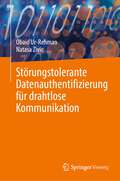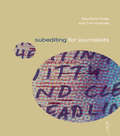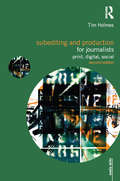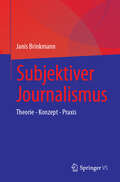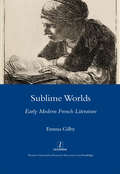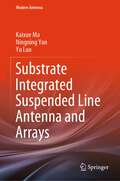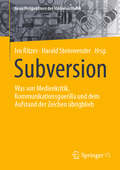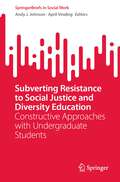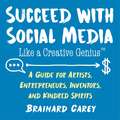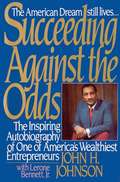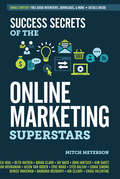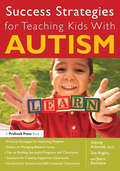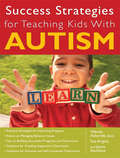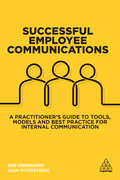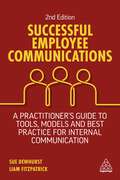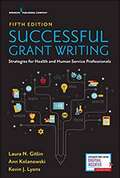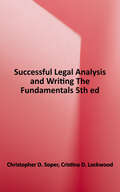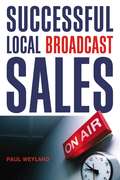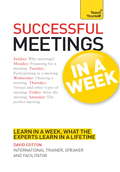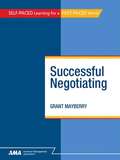- Table View
- List View
Style: The Basics of Clarity and Grace
by Joseph Bizup Joseph WilliamsStyle: The Basics of Clarity and Grace reflects the wisdom and clear authorial voice of Williams' best-selling book, Style: Lessons in Clarity and Grace, while streamlining every chapter to create a very brief, yet powerfully direct guide to writing with style. The concise clarity of this book makes it a handy reference for anyone interested in good writing--as well as a quick and ideal guide for freshman composition courses, writing courses across the disciplines, and as a supporting text in courses that require clear and direct writing. Style: The Basics covers the elemental principles of writing that will help students diagnose the strengths and weaknesses of their prose quickly and revise effectively. The text features principles of effective prose written in Williams' hallmark conversational style, offering reason-based principles, rather than hard and fast rules, for successful, effective writing.
Style: The Basics of Clarity and Grace (4th Edition)
by Joseph M. Williams Gregory G. ColombStyle: The Basics of Clarity and Grace reflects the wisdom and clear authorial voice of Williams' best-selling book, Style: Lessons in Clarity and Grace, while streamlining every chapter to create a very brief, yet powerfully direct guide to writing with style. The concise clarity of this book makes it a handy reference for anyone interested in good writing.
Störungstolerante Datenauthentifizierung für drahtlose Kommunikation
by Obaid Ur-Rehman Natasa ZivicDieses Buch gibt einen Einblick in die Herausforderungen der Datenauthentifizierung über drahtlose Kommunikationskanäle. Die Autoren gehen davon aus, dass die etablierten Standard-Authentifizierungsmechanismen nicht ausreichen, um Daten wie Sprache, Bilder und Videos über drahtlose Kanäle zu authentifizieren, da die drahtlose Kommunikation durch zahlreiche Störungen gekennzeichnet ist. Die Autoren schlagen neue Mechanismen vor, die auf so genannten Soft-Authentifizierungsalgorithmen basieren, die einige Änderungen an den zu schützenden Daten tolerieren. Die Autoren erklären, dass das Ziel dieser Algorithmen darin besteht, tolerant gegenüber inhaltlichen Änderungen auf Grund von Übertragungsfehler zu sein, aber dennoch in der Lage zu sein, Fälschungen zu erkennen. Ein weiterer Vorteil der Soft-Authentifizierungsalgorithmen besteht darin, dass sie in der Lage sind, die veränderten Stellen zu identifizieren und sie nach Möglichkeit zu korrigieren. Die Autoren zeigen, wie man dies erreicht, indem man die Datenmerkmale mit Hilfe von fehlerkorrigierenden Codes schützt. · Erörtert Methoden zur Authentifizierung von Daten (insbesondere von Bildern) bei Übertragungsstörungen, die bei der drahtlosen Kommunikation auftreten; · Stellt eine neue Klasse von Soft-Authentifizierungsmethoden vor, die anstelle der üblichen Hard-Authentifizierungsmethoden verwendet werden, um geringfügige Änderungen der Bilddaten zu tolerieren; · Verfügt über Authentifizierungsmethoden, die auf der Verwendung von Authentifizierungscodes und digitalen Wasserzeichen basieren
Subediting and Production for Journalists: Print, Digital & Social
by Tim Holmes Wynford HicksSubediting for Journalists is a concise, up-to-date and readable introduction to the skills of subediting for newspapers and magazines. It describes how subediting has developed, from the early days of printing to the modern era of computers and the web, and explains clearly what the sub now has to do.Using practical examples from newspapers and magazines, Subediting for Journalists introduces the various techniques involved in subediting from cutting copy to writing cover lines. It includes:*house style explained with model stylebook provided*examples of bad journalistic English such as misused clichés and pronoun confusion*subbing news and features for sense and style*editing quotes and readers' letters*projecting copy by writing headlines and standfirsts*checking pictures and writing captions*principles and methods of proofreading*making copy legally safe*understanding production and using software packages *website subbing*a glossary of journalistic terms and suggestions for further reading
Subediting and Production for Journalists: Print, Digital & Social (Media Skills)
by Tim HolmesThe new edition of Subediting and Production for Journalists is a concise, clear and contemporary introduction to the skills required for subediting newspapers, magazines and websites. Tim Holmes describes how subediting has developed, from the early days of print to the modern era of the internet browser and social media, and explores the many challenges for the sub working today. Using numerous practical examples drawn from print and online, Subediting and Production for Journalists introduces the various techniques employed by the sub to help make the written word stand out on the page, including: subbing news and features for sense and style writing headlines and sells making copy legally safe understanding production, using software packages and content management systems editing and rewriting stories for online publication creating suitable page furniture for websites handling and sizing pictures digitally handling audio and video. Subediting and Production for Journalists is the perfect guide for all those with an interest in subbing in today’s multimedia environments, as well as anyone wanting to see their words come to life.
Subjektiver Journalismus: Theorie - Konzept - Praxis
by Janis BrinkmannJournalismus wandelt sich – und bringt zunehmend neue Formen und Formate hervor, die u.a. investigative, narrative, interpretative oder partizipative Muster, Mechanismen und Merkmale des Journalismus integrieren und neu arrangieren. Doch wie sich ein teils explizit subjektiver und meinungsbasierter „Neuer Journalismus“ entwickelt und in der Praxis an Einfluss gewinnt, ist angesichts der oft fluiden Forschungsgegenstände in der Journalistik bislang nicht erforscht. Die vorliegende Studie, die am Institut für Journalistik an der Fakultät Kulturwissenschaften der Technischen Universität Dortmund als Habilitationsschrift eingereicht wurde, widmet sich daher Programmen, Praktiken und Leistungspotenzialen eines subjektiven Journalismus, wie er sich gegenwärtig in Formen des Social Journalism vollzieht (z.B. bei funk, Vice, BuzzFeed), der über soziale Medien jüngere Zielgruppen adressiert und sich radikal an deren Thematisierungs-, Präsentations-, Nutzungs- und Rezeptionserwartungen orientiert.Vor einer konstruktivistisch geprägten Hintergrundfolie wird zunächst ein integrativ-intergrativer Theorierahmen aufgespannt, der strukturell-individualistische mit figurations-analytischen und praxistheoretischen Bausteinen verknüpft, um die Konstruktionsprogramme, Praxiskonstellationen und Leistungspotenziale von Formen des subjektiven Journalismus zu rekonstruieren, zu analysieren und zu bewerten. Dafür wird ein triangulatives Methodendesign gewählt: Anhand kontemporärer Angebote eines subjektiven Journalismus, der sich besonders augenfällig in den Presenter-Reportagen des öffentlich-rechtlichen Content-Netzwerks funk manifestiert, werden Programme, Praktiken und Potenziale des subjektiven Journalismus durch quantitative und qualitative Inhaltsanalysen sowie eine flankierende Expert:innen-Befragung beteiligter Journalist:innen untersucht, um daraus Muster, Mechanismen und Merkmale eines „Neuen Journalismus“ zu destillieren. Als zentrales Ergebnis der Studie gewinnt eine nach den Mechanismen sozialer Medien für junge Zielgruppen aktualisierte und modifizierte Form des radikal subjektiven New Journalism an Kontur: Journalistische Wirklichkeit konstruieren Reporter:innen über eine an Zielgruppen- und Lebenswelt-Themen junger Publika orientierte Thematisierung, hybride Web-Reportagen, die konsequent eigene Meinung bzw. Haltung sowie subjektive Perspektiven integrieren sowie eine starke Fokussierung auf sich selbst und auf Protagonist:innen als Quellen und Akteure. Die Unterschiede zwischen verschiedenen empirisch rekonstruierbaren subjektiven Journalismen wie die eher reporter- bzw. recherche-getriebenen Slow Journalism und Gonzo-Journalismus oder die stärker protagonisten- bzw. emotions-getriebenen empathischer Journalismus und Selfie-Journalismus lassen sich am Beispiel der ausgewählten funk-Formate Y-Kollektiv, STRG_F, reporter, follow me.reports und Die Frage prägnant herausarbeiten. Für subjektiv modifizierte Praktiken wie thesengeleitete Recherche, interpretatives Storytelling, On-Presenting oder ein reflexives Framing greifen die Reporter:innen auf Modalitäten von Signifikationsregeln und autoritative Ressourcen wie persönliche Erfahrungen und Erlebnisse, eigene Meinungen und Haltungen sowie subjektive Darstellungs- und Erzählmuster zurück, die zu einem nunmehr artifiziell inszenierten und nicht länger authentisch konstruierten „strategischen Ritual“ der Subjektivität degenerieren, wenn Praxiskonstellationen wie die storybasierte Enthüllung, teilnehmende Beobachtung, emotionale Befragung oder selbstzentrierte Begleitung repetitiv Subjektivität in alle journalistischen Praktiken weben.
Sublime Worlds: Early Modern French Literature
by Emma GilbySome of the language we come across, in reading other peoples' works or listening to others speak, moves us profoundly. It requires a response from us; it occupies and involves us. Writers, always readers and listeners as well, are fascinated by this phenomenon, which became the subject of the classical treatise On the Sublime , traditionally attributed to Longinus. Emma Gilby looks at this compelling and complex text in relation to the work of three major seventeenth-century authors: Pierre Corneille, Blaise Pascal and Nicolas Boileau. She offers, in each case, intimate critical readings which spin out into broad interrogations about knowledge and experience in early modern French literature.
Substrate Integrated Suspended Line Antenna and Arrays (Modern Antenna)
by Kaixue Ma Ningning Yan Yu LuoThis book delves deeply into the substrate integrated suspended line antenna technologies and evaluates its potential to replace conventional three-dimensional (3D) metal-based antennas. Over the years, studies on substrate integrated suspended line antennas have captivated engineers and scientists from the antennas and related engineering fields, all aiming to achieve low-cost and low-loss characteristics. The book establishes a fundamental framework for this topic, while emphasizing the importance of substrate integrated suspended line antennas in the wireless communication and radar systems. It is designed for undergraduate and graduate students who are interested in antenna technology, researchers investigating substrate integrated technology, and antenna engineers working on low-cost and low-loss antennas and arrays.
Subversion: Was von Medienkritik, Kommunikationsguerilla und dem Aufstand der Zeichen übrigblieb (Neue Perspektiven der Medienästhetik)
by Ivo Ritzer Harald SteinwenderGalt einst noch als Primat „neulinker“ Medienkritik, im „Pop" das Widerständige, das subkutan Aufklärerische, überhaupt ein grundsätzlich subversives Potenzial zu erkennen, so müssen wir heute in der postbürgerlichen Gesellschaft neotribaler Rackets einen doppelten Backlash konstatieren, der – in Theorie wie kultureller Praxis – Pop oft identitär und damit: reaktionär deutet. Die Autorinnen und Autoren dieses Bandes fragen, was von den subversiven Konzepten der „semiologischen Guerilla“ (Eco) und dem „Aufstand der Zeichen“ (Baudrillard) übrigblieb, was als subversiv in der Populärkultur gelten, und ob Subversion in der populären Kultur überhaupt eine „Rebellion gegen jede Form von Macht und Unterdrückung“ (Agnoli) sein kann. Der Band analysiert in Einzelstudien sowohl Theorie- als auch Kulturproduktionen aus dem Zeitraum vom Zweiten Weltkrieg bis heute, sowohl um bestimmte Traditionen historisch zu rekonstruieren als auch vor aktuellem Horizont neu zu situieren.
Subverting Resistance to Social Justice and Diversity Education: Constructive Approaches with Undergraduate Students (SpringerBriefs in Social Work)
by Andy J. Johnson April VindingThis compact book is constructed using psychological theory and research to empower university faculty to facilitate student engagement and address student resistance to diversity and social justice education more effectively. University faculty teaching diversity and social justice have traditionally encountered various forms of student resistance. Recent cultural trends of political opposition to teaching critical race theory and other forms of increased polarization and scapegoating with decreased levels of social tolerance have exacerbated challenges in promoting student engagement in diversity and social justice education in universities and colleges. In contrast to traditional models that tend to be confrontational in addressing student biases, the new Moving Towards Social Justice (MTSJ), Relational Partnership Development Model (RPDM) and process theoretical models seek to build on appropriate pre-existing strengths, interests, values, and the developmental readiness of students who might otherwise oppose learning about the contexts, lives, and predicaments of marginalized persons living in various intersections of gender, race, ethnicity, national origin, immigration status, sexual orientation, gender identity and ability/disability status. Emphasis is placed on the development of professional and life skills, such as wisdom and intercultural competence, which provide incentives and remove barriers to learning about social justice and diversity. Project-based learning approaches grounded in a developmental framework to foster the thriving and well-being of diverse students, collaborative partners in the community, and diverse persons served by the community partners are emphasized. The role of empirical assessment, feedback, and program refinement over time is also delineated within the models.Subverting Resistance to Social Justice and Diversity Education: Constructive Approaches with Undergraduate Students is an indispensable and timely resource for university and college instructors who teach courses or have significant portions of a class that involve education around social justice, diversity, and intersectionality issues, such as cross-cultural psychology, multicultural psychology, social work, sociology, intercultural communication, and counseling or clinical practice with individuals or families from diverse social locations. University officers of diversity, faculty development providers, and other administrators interested in empowering university faculty to increase student engagement in social justice and diversity education also would find the book a useful reference.
Succeed with Social Media Like a Creative Genius: A Guide for Artists, Entrepreneurs, and Kindred Spirits (Like a Creative Genius)
by Brainard CareyHow to Build a Following, Make Authentic Connections, and Promote Your Work Whether you’re an artist or craftsman selling your work, the owner of a small start-up hoping to network, or just looking for a more meaningful social media experience, this is the book for you. Brainard Carey draws from his experience and interviews with others to show creative people how to make the most of their time on outlets like Twitter, Facebook, and Instagram. Readers will learn how to develop social media campaigns that reflect their personalities, share their unique offerings, and achieve their goals. Chapter topics include: Building a following Maintaining an authentic image Creative ways to share information Using social media to earn a living And much more With chapters focusing on practical how-tos and real-world examples, Succeed with Social Media Like a Creative Genius™ provides readers with both instructive and demonstrative lessons in making the most of their online presence. Everyone can do it with the right tools, and Carey offers an insider's guide to an otherwise daunting process. This book will awaken and nurture the creative genius in everyone.
Succeeding Against the Odds
by John J. Johnson Lerone Bennett Jr.Story of the most successful black American businessman, John H. Johnson.
Succeeding with Senior Management: Getting the Right Support at the Right Time for Your Project
by G. Michael CampbellSenior managers speak the language of strategy. Project managers use the language of tasks and activities. While they rely on each other to achieve their goals, this core incompatibly can lead to communication breakdowns and project setbacks.Succeeding with Senior Management explains how to bridge the gap and engage the upper ranks. By establishing relationships early on, understanding executives, and keeping them involved, project managers win the support they need—especially critical when problems arise. This one-of-a-kind communications guide explains how to:Navigate the company?s political watersLink the project to the businessDevelop a case for change with an executive sponsorUse the right listening styleProvide options and recommendations for major decisionsInvolve the sponsor in resolving cross-functional problemsAnd moreMany executives will set a project in motion and then move on. Learn how to keep them involved, motivated to push obstacles aside, and focused on a successful conclusion. Your career prospects depend on it.
Success Secrets of the Online Marketing Superstars
by Mitch MeyersonEager business owners gain access to the playbooks of 23 of today's most respected and well-known online marketers, who reveal their most valuable online strategies and tactics for capturing new customers and influencing ongoing purchases from current ones. Each chapter is a coaching session designed to help business owners avoid the pitfalls and mistakes by the experts who have been there and done that. Readers learn how to develop a personal media brand, build a total online presence, and create a social media strategy that increases traffic. They also discover how to develop and use content that converts visitors into buyers and ultimately loyal customers, succeed with SEO, pay-per-click, and linking strategies that get websites ranked. Also included is information on leveraging social networking apps, including Facebook, online video, and Instagram, and avoiding the mistakes made by new online businesses.
Success Strategies for Teaching Kids With Autism
by Wendy Ashcroft Sue Argiro Joyce KeohaneAlthough an abundance of research exists on working with students with autism, teachers need the practical strategies in Success Strategies for Teaching Kids With Autism to build successful programs and services for kids with autism.The authors, seasoned classroom teachers and consultants for a large public school autism support program, look at ways teachers can apply best practices for teaching special needs students. They offer field-tested ideas for teachers to implement, covering topics such as managing difficult behaviors, teaching social skills, addressing communication difficulties, creating schedules, and organizing the classroom.The book includes a detailed section on using applied behavior analysis, providing practical examples for teachers to employ in their own classrooms in order to modify student behaviors and increase learning. Including teacher-friendly overviews of the educational needs of students with autism and ideal teaching methods, the book also provides reproducible materials and photographs that show the strategies in action.
Success Strategies for Teaching Kids With Autism
by Wendy AshcroftSuccess Strategies for Teaching Kids with Autism - Wendy Ashcroft, PhD, Sue Argiro, Joyce KeohaneThe perfect handbook for any teacher looking for proven solutions for helping children with autism succeedAlthough an abundance of research exists on working with students with autism, teachers need the practical strategies in Success Strategies for Teaching Kids With Autismto build successful programs and services for kids with autism. The authors, seasoned classroom teachers and consultants for a large public school autism support program, look at ways teachers can apply best practices for teaching special needs students on smaller budgets, tight schedules, and minimal materials. They offer more than 25 field-tested ideas for teachers to implement, covering topics such as managing difficult behaviors, teaching social skills, addressing language and communication difficulties, creating schedules, and organizing the classroom. Including teacher-friendly overviews of the educational needs of students with autism and ideal teaching methods, the book also provides reproducible materials that teachers can copy and use immediately in their classrooms, along with photographs and detailed graphics that show their strategies in action. Features proven advice and strategies from experienced special educatorsAddresses the three main areas of need for students with autism: language, social skills, and behavior managementOffers practical solutions to creating an autism-friendly classroomProvides a concise introduction to the educational needs of students with autismIncludes guidance for both inclusion and self-contained classroomsPrufrock Press offers award-winning products focused on gifted, advanced, and special needs learners. For more than 20 years, Prufrock has supported parents and teachers with a wide range of resources based on sound research. The average day of a parent or teacher of a gifted or special needs learner is filled with a thousand celebrations and challenges. Prufrock's goal is to provide practical solutions to those challenges-to provide readers with timesaving, research-based tools that allow them to spend less time on the challenges and more time on the celebrations. Prufrock Press' line of products features:Resources on parenting the special needs learnerSage advice on teaching in the inclusive classroomAdvanced learning tools for gifted children and inquisitive learnersCutting-edge information on innovative teaching approachesResources for college planning for gifted and special needs learnersPrufrock Press is committed to resources based on sound research. It has a senior advisory group composed of the top scholars in the field of education and psychology. All of the company's editors have graduate degrees in education or children's literature, and they all have classroom experience. In essence, when a reader holds a book by Prufrock Press, he or she knows that the information found in that book will be research-based and reflect agreed upon best practices in the field of education and child psychology.
Successful Employee Communications: A Practitioner's Guide to Tools, Models and Best Practice for Internal Communication
by Liam FitzPatrick Sue DewhurstCommunicating a company's goals, strategy and tactics, change processes and brand values effectively within the workplace, makes a real difference to the success of any business. When handled professionally, it has a positive impact on employee engagement, organizational culture and performance. Successful Employee Communications shares the stories of leading practitioners and focuses on the tools, models and practices that have worked in a variety of situations and range of organizations. Drawing on case studies from well known organizations in the public, private and not for profit sectors, this book includes insights from manufacturing, telecoms, pharmaceuticals, professional services, FMCG and more. It explains how to make the case for internal communications at all levels, advising on how to set objectives, select the right communication channel, suggest the best way to deliver tough messages, and evaluate and collect effective data. Successful Employee Communications is an essential guide for anyone responsible for managing the communications around employee engagement, motivation, retention and change management.
Successful Employee Communications: A Practitioner's Guide to Tools, Models and Best Practice for Internal Communication
by Liam FitzPatrick Sue DewhurstCommunicating effectively is crucial to improving employee engagement, organizational culture, and performance. Learn how to focus your time and resources to make the most positive difference to your organization and its people. Successful Employee Communications explores how to help organizations work with purpose, be better listeners and connect with employees who have higher expectations and new ways of working. Easy-to-follow frameworks and checklists will help you conduct an internal communication audit, develop and measure a communication plan, work with difficult news and behaviour change, and support leaders to be more effective communicators.Written by leading PR and internal communications experts and packed with new case studies and updated content, this second edition of Successful Employee Communications blends theory and practice, sharing insights and lessons from global organizations including AB InBev, Cambridge University, Reckitt and the Organisation for Economic Co-operation and Development (OECD). It is essential reading for anyone responsible for internal communication, employee engagement, organizational culture or employee experience in the new world of work.
Successful Grant Writing for Health and Human Service Professionals
by Kevin J. Lyons Laura Gitlin Ann KolanowskiFollowing in the tradition of its previous editions, the updated and fully revised fifth edition of this classic guide to grant writing is especially written for health and human service professionals. It provides a comprehensive, systematic, and easy-to-follow, step-wise guide to writing competitive grant proposals for research, education, innovative practices and demonstration projects. Never has the need to advance evidence to improve the health of the public been greater. Generating evidence requires funding and grant writing has become an essential activity for every health and human service professional who must seek funds to advance innovative research, education and practice initiatives. <p><p> Uniquely focused on developing grant writing skills as part of a professional’s career, this one-of-a-kind guide addresses the full range of essential competencies needed to assure success. The new edition expands coverage on how to compose an effective aims page, how to write a compelling literature review to support significance of a proposal, and describes considerations for specific types of study designs. Additionally, this grant writing book provides a more extensive discussion of mentorship, plus tips for pre-doctoral students and post-doctoral fellows. <p><p> New to the Fifth Edition: <p> Spotlights important new trends that can make or break grant success <p>Features Professional Spotlights reflecting the experiences and advice from successful grant writers – from novice to expert <p>Highlights special considerations for pre-doctoral students and post-doctoral fellows <p>Examines how to write an effective grant application for specific types of study designs <p>Explains how to craft compelling statements about significance and innovation <p>Provides guidelines on mentorship <p>Covers ways to manage post-award activities and offers strategies and templates for documenting grant progress <p><p> Key Features: <p>Key summary points in every chapter <p>Case examples throughout <p>Strategies for managing a grant writing team and post-award activities <p>Considerations in building a grant writing career and matching your level of experience to funding mechanisms <p>Testimonies from novices and experts describing their unique grant writing experiences <p>--Publisher: Springer Publishing
Successful Legal Analysis and Writing: The Fundamentals
by Christopher D. Soper Cristina D. LockwoodThis work is a practical legal analysis and writing handbook. Designed for first-year students, it is also a valuable refresher text for more advanced students, and practitioners. This easy-to-read book features fundamental advice on how to communicate written and oral legal analysis from a problem-solving perspective. It features illustrative examples and templates. The fifth edition includes additional examples and models, and appendices with practice exercises and sample answers, all created in collaboration between one author with recent practice experience and one who has been teaching for over twenty years. It also incorporates professional ethical and technological considerations throughout, while providing learning objectives for each chapter.
Successful Local Broadcast Sales
by Paul WeylandFor the right person, a career in media sales can be glamorous, rewarding, and lucrative. But without the right guidance, it can also be challenging. Author Paul Weyland has decades of experience working with local direct clients. Now, in Successful Local Broadcast Sales he shares his hard-won wisdom, showing television, radio, and cable salespeople how to get more sales. This invaluable resource gives readers the tools they need to:• get appointments • write great proposals and presentations • sell against other media like newspapers and the Internet • overcome rate resistance • close sales without alienating their clients • create genius creative without being a creative genius • calculate ROI for the client’s advertising dollar • land long-term contracts with local businesses • negotiate more effectivelyHonest, practical, and accessible, this is the one handbook that shows novice and veteran salespeople how to thrive—not just survive—in the media business.
Successful Meetings in a Week: Teach Yourself
by David CottonThe ability to hold successful meetings is crucial to anyone who wants to advance their career.Written by David Cotton, a leading expert on meetings as both a coach and practitioner, this book quickly teaches you the insider secrets you need to know to in order to run successful meetings.The highly motivational 'in a week' structure of the book provides seven straightforward chapters explaining the key points, and at the end there are optional questions to ensure you have taken it all in. There are also cartoons and diagrams throughout, to help make this book a more enjoyable and effective learning experience.So what are you waiting for? Let this book put you on the fast track to success!
Successful Meetings in a Week: Teach Yourself
by David CottonThe ability to hold successful meetings is crucial to anyone who wants to advance their career.Written by David Cotton, a leading expert on meetings as both a coach and practitioner, this book quickly teaches you the insider secrets you need to know to in order to run successful meetings.The highly motivational 'in a week' structure of the book provides seven straightforward chapters explaining the key points, and at the end there are optional questions to ensure you have taken it all in. There are also cartoons and diagrams throughout, to help make this book a more enjoyable and effective learning experience.So what are you waiting for? Let this book put you on the fast track to success!
Successful Negotiating
by Grant MayberryHow to achieve positive outcomes using planning and conversational techniques. Very few of us are born negotiators. However, Successful Negotiating can teach you the art of win/win negotiation. You’ll get a firm grasp of the negotiating tricks and techniques the pros use. Learn everything from prenegotiation planning to the use of seemingly unimportant details like seating arrangements and meeting site selection to influence the results of negotiations. You will learn how to: • Sway an opponent with timing and association techniques • Identify an opponent's real but often hidden needs • Use questions to control the thrust of a discussion • Employ proven strategies like the "missing man," "straw issues," and "walkout" ploys • Communicate a position clearly and precisely • Plan a realistic course of action based on sound preparation and an objective appraisal of resources • Keep the negotiation process open to reasonableness and flexibility at all times • Draw on your own skills, experience, and self-discipline to keep the process moving in the direction you want
